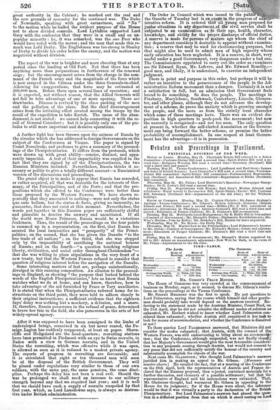- The Order in Council which was issued to the
pubh rather an incentive to the perseverance of the people in the Ad- good men, and likely, it is understood, to exercise an independent ministrative Reform movement than a damper. Certainly it is not a satisfaction in full, but an admission that Government feels
junior situations in ady dipartment of the civil service shall be
useful under a good Government, very dangerous under a bad one. The Commissioners appointed to carry out the order as examiners are Sir Edward Ryan, Mr. Lefevre, and Mr. Edward R,omilly,—
early education has been neglected. It is a reserve, in short, very A reserve is made for persons of mature age whom the chief of any department considers it desirable to appoint without examina- tion; a reserve that may be used for electioneering purposes, but that might also be used to admit men of high capacity whose istrative reform. It is ordered 'that all young men proposed for knowledge, and ability for the proper discharge of official duties. subjected to an examination as to their age, health, character, the Gazette of Tuesday last is an event in the progress of a There is point and purpose in this order, but perhaps it will be bound to do something. So does the, people. The meetings in Finsbury, Marylebone Southwark, Canterbury, Lincoln, Glouces- ter, and other places, although they do not advance the develop- ment of a scheme, do prove the anxiety which is growing amongst the people, and the more so from the -strictly local character which some of these meetings have. There was an evident dis- position in high quarters to pooh-pooh the movement ; but now the necessity is recognized—and not too soon. The only question at present is, whether the self-elected Association .or. the Govern- ment can bring forward the better scheme, or promise the better probability of accomplishment. In one respect at least Govern- ment has the advantage—it is in possession.


































 Previous page
Previous page